Information Theory Laboratory
National Chiao Tung University
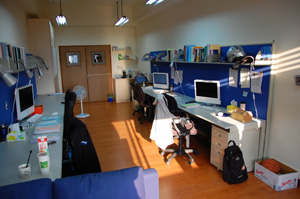 |
 |
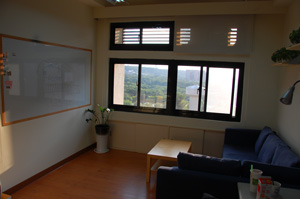 |
photos of former location
click to enlarge
For more photos see Photo-Galleries
Contents
About Us
The Information Theory Lab was a small research laboratory in the Department of Electrical and Computer Engineering at National Chiao Tung University (NCTU), Hsinchu, Taiwan. Originally located in Engineering Building IV, Lab 716A, the lab currently has no physical location anymore, but exists virtually. We concentrate our time, research, and teaching to the field of information theory which constitutes the theoretic physical foundation of any communication system.
Our mottos are as follows:
- We proudly do interesting research in the field of information theory.
- We proudly try to find new results that improve our understanding of communication systems.
- We proudly do fundamental research even if not all our results are immediately applicable in practical systems.
- We proudly offer courses that try to cover some fundamental topics in depth — we very much try to avoid teaching that only scratches on surfaces.
- We proudly work in a Microsoft Windows- and Microsoft Office-free environment.
- We proudly rely on LaTeX for a beautiful presentation of our results.
Research
Molecular Communication of Nano-Devices
When nano-devices try to communicate with each other or with some receiving station, it might not be possible to use traditional signal propagation via electromagnetic waves because, for example, the nano-device is too small to accommodate the minimal necessary antenna size or it does not possess enough power. Instead we propose a communication system that is based on the release time of chemical molecules that will travel in a fluid medium from a transmitter to a receiver. We investigate a channel model describing such communication and show new bounds on the channel capacity, i.e., the maximum amount of information that can be transmitted over this channel.
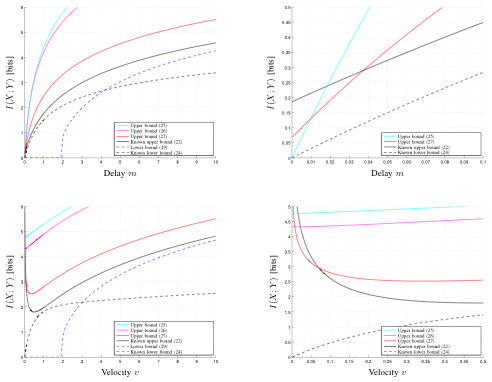
Finite Blocklength Communication
In his world-famous paper of 1948, Shannon defined channel capacity as the ultimate rate at which information can be transmitted over a communication channel with an error probability that will vanish if we allow the blocklength to get infinitely large. While this result is of tremendous theoretical importance, the reality of practical systems looks quite different: no communication system will tolerate an infinite delay caused by an extremely large blocklength, nor can it deal with the computational complexity of decoding such huge codewords. Hence, we have started investigating the fundamental limitations of communication systems if we only have a finite delay.
We propose optimal code designs for various binary channels with only a few codewords and of short blocklength.
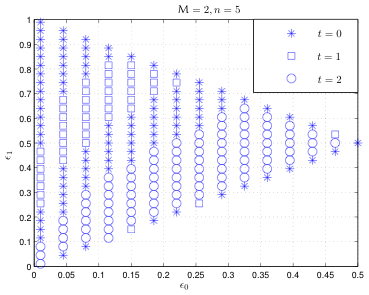
Optical Communication: Fiber or Air
Optical communication is the future of high-speed, high-volume, and high-security communication. While optical communication through fiber is the backbone of the worldwide internet, optical communication through air is also becoming increasingly popular because of its ease of installation, its high bandwidth and its security (it is very difficult to intercept such communication without detection).
We investigate several channel models that describe various different setups of optical communication: Poisson channel, free-space optical intensity channel, and an optical intensity channel with input-dependent Gaussian noise. We propose new bounds on the capacity of all models.
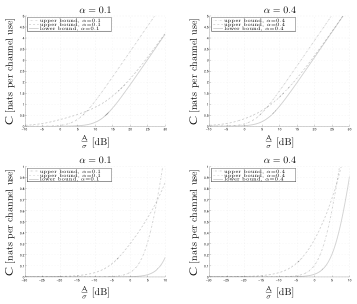
MIMO Wireless Communication
The importance of wireless communication in our daily life needs not to be emphasized anymore. As we are heading towards the next generation mobile and wireless communication (4G) with once again higher bandwidth, having multiple-antenna devices also on the low-end consumer side will become inevitable. So MIMO fading channels have become a hot research topic.
Usually, the analysis of MIMO fading channels is done under two unrealistic, simplifying assumptions: firstly the fading is assumed to be Gaussian distributed, and secondly it is assumed that the receiver has access to a perfect reading of the current value of the fading. We are among the first who drop these impracticable simplifications and instead analyze MIMO fading channels for general distributions including memory and without the assumption of perfect channel state information at the receiver. Note that we do not restrict the receiver to try everything in its power to achieve such knowledge, however, any such effort is taken into account in our analysis and we also incorporate the fact that there always will be residual estimation and measurement errors.
Under these extremely general conditions we derive upper and lower bounds on capacity and are able to derive the capacity's exact value in the asymptotic high-power limit. We show that capacity grows only double-logarithmically in the SNR for such realistic channel models, which is in stark contrast to the overly optimistic logarithmic growth predicted by the simplified models assumed before.
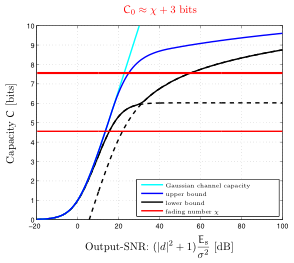
Teaching
The IT-Lab has offered in the past the following courses:
- Information Theory: This course introduces information theory and gives its most important results: lossless data compression and reliable communication over a noisy channel. The course is thought to be taken either in the first year of the graduate program or in the last year of undergraduate studies.
- Advanced Topics in Information Theory: This is a continuation of the Information Theory course and covers more advanced topics in the field of information theory that are not taught in the basic introduction, like, e.g., distortion theory, types, and multiple user transmission systems.
- Linear Algebra: This is a compulsory basic course in the first year of the undergraduate program giving a detailed introduction to linear algebra, in particular to matrices, vector spaces, and eigenvalues.
- Probability: This is a compulsory basic course in the second year of the undergraduate program giving a detailed introduction to probability theory.
- Introduction to Communication Systmes (Principles in Communication Engineering I): This is a basic course in the third year of the undergraduate program introducing the foundations of digital communication.
- Principles in Communication Engineering II: This is a basic course in the third year of the undergraduate program giving an overview over the most important aspects of communication systems.
For more details about our present, previous, and future courses we refer to the teaching homepage of our lab. Note that for the two main courses Information Theory and Advanced Topics in Information Theory we offer our own lecture notes in book form.
Lab Members
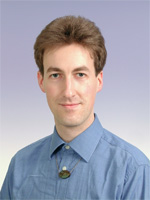 |
Name: | Prof. Dr. Stefan M. Moser | |
| Chinese Name: | 莫詩台方 | ||
| Origin: | Liestal, Switzerland | ||
| Status: | Head of the IT-Lab | ||
| E-mail: |  |
||
| Member since: | August 2005 | ||
| Research projects: | channel capacity of various channels | ||
| Private interests/ Hobbies: | skiing, badminton, bass-clarinet, clock and watch collection, traveling, reading, movies and theater | ||
| You may ask me questions about: | Mac OS X, LaTeX, fading number, Harry Potter, Lord of the Rings, our coffee machine | ||
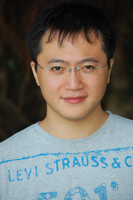 |
Name: | Dr. Lin Hsuan-Yin | |
| Chinese Name: | 林玄寅 | ||
| Origin: | Miaoli, Taiwan | ||
| Status: | Post-Doc | ||
| E-mail: |  |
||
| Member since: | September 2007 | ||
| Research project: | Ph.D. thesis: Optimal Ultra-Small Block-Codes for Binary Input Discrete Memoryless Channels | ||
| Private interests/ Hobbies: | American/Japanese/Korean dramas, training, cycling, badminton, traveling | ||
| You may ask me questions about: | comics, LaTeX, MATLAB | ||
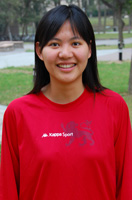 |
Name: | Guo Yuan-Zhu | |
| Chinese Name: | 郭沅竹 | ||
| Origin: | Taipei, Taiwan | ||
| Status: | Master's student of NCTU, second year | ||
| E-mail: |  |
||
| Member: | November 2010 – July 2014 | ||
| Research project: | Master's thesis: The Asymptotic Capacity of Noncoherent Single-Input Multiple-Output Fading Channels with Memory and Feedback | ||
| Private interests/ Hobbies: | Swimming, biking, waterpolo | ||
| You may ask me questions about: | Bike traveling, fourteen months in Switzerland | ||
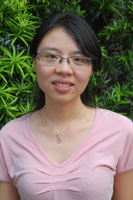 |
Name: | Lee Ting-Hsuan | |
| Chinese Name: | 李庭萱 | ||
| Origin: | Taipei, Taiwan | ||
| Status: | Graduated (M.Sc. NCTU) | ||
| E-mail: |  |
||
| Member: | August 2012 – July 2013 | ||
| Research project: | Master's thesis: Molecular Communication in a Liquid: Bounds on the Capacity of the Additive Inverse Gaussian Noise Channel with Average and Peak Delay Constraints | ||
| Private interests/ Hobbies: | Soap operas (Amerian episodes), computer games | ||
| You may ask me questions about: | Soap operas (Amerian episodes) | ||
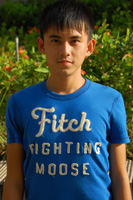 |
Name: | Huang Yu-Ming | |
| Chinese Name: | 黃昱銘 | ||
| Origin: | Taipei, Taiwan | ||
| Status: | Graduated (M.Sc. NCTU) | ||
| E-mail: |  |
||
| Member: | August 2011 – July 2013 | ||
| Research project: | Master's thesis: The Fading Number of Multiple-Access General Fading Channels | ||
| Private interests/ Hobbies: | Tennis, mahjong, cooking | ||
| You may ask me questions about: | Tennis, mahjong | ||
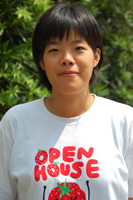 |
Name: | Chang Hui-Ting | |
| Chinese Name: | 張惠婷 | ||
| Origin: | Kaohsiung, Taiwan | ||
| Status: | Graduated (M.Sc. NCTU) | ||
| E-mail: |  |
||
| Member: | November 2009 – March 2013 | ||
| Research project: | Master's thesis: Molecular Communication in Fluid Media: Bounds on the Capacity of the Additive Inverse Gaussian Noise Channel | ||
| Private interests/ Hobbies: | Biking, traveling, hiking, basketball | ||
| You may ask me questions about: | Budget travel, basketball | ||
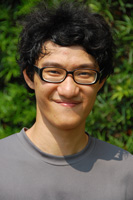 |
Name: | Chou Yu-Hsing | |
| Chinese Name: | 周育興 | ||
| Origin: | Kaohsiung, Taiwan | ||
| Status: | Graduated (M.Sc. NCTU) | ||
| E-mail: |  |
||
| Member: | August 2010 – August 2012 | ||
| Research project: | Master's thesis: The Fading Number of Multiple-Access Rician Fading Channel with Memory | ||
| Private interests/ Hobbies: | Comics, classic and popular music, weight training | ||
| You may ask me questions about: | Comics, music and computer games | ||
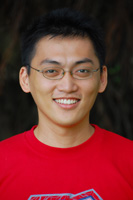 |
Name: | Chen Wei-Hsiang | |
| Chinese Name: | 陳偉翔 | ||
| Origin: | Taichung, Taiwan | ||
| Status: | Graduated (M.Sc. NCTU) | ||
| E-mail: |  |
||
| Member: | September 2008 – August 2010 | ||
| Research project: | Master's thesis: On the Capacity of the Discrete-Time Poisson Channel | ||
| Private interests/ Hobbies: | Basketball, Internet surfing | ||
| You may ask me questions about: | Basketball skills | ||
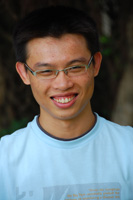 |
Name: | Lin Gu-Rong | |
| Chinese Name: | 林谷嶸 | ||
| Origin: | Houli, Taichung, Taiwan | ||
| Status: | Graduated (M.Sc. NCTU) | ||
| E-mail: |  |
||
| Member: | September 2007 – July 2009 | ||
| Research project: | Master's thesis: Capacity Analysis of Multiple-Access Rician Fading Channel | ||
| Private interests/ Hobbies: | Watching baseball games, folk dances | ||
| You may ask me questions about: | Basic skills and concepts about folk dances | ||
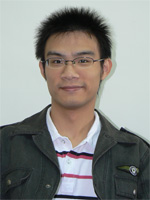 |
Name: | Lin Ding-Jie | |
| Chinese Name: | 林鼎傑 | ||
| Origin: | Banqiao, Taipei, Taiwan | ||
| Status: | Graduated (M.Sc. NCTU) | ||
| E-mail: |  |
||
| Member: | September 2006 – July 2008 | ||
| Research project: | Master's thesis: On the Capacity of Free-Space Optical Communication Channels | ||
| Private interests/ Hobbies: | playing basketball, watching TV, sleeping | ||
| You may ask me questions about: | computer hardware, Warcraft | ||
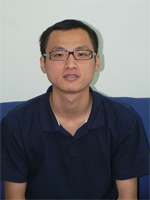 |
Name: | Lai Chien-Sheng | |
| Chinese Name: | 賴建盛 | ||
| Origin: | Changhwa, Taiwan | ||
| Status: | Graduated (M.Sc. Chalmers University, Sweden, B.Sc. NCTU) | ||
| E-mail: |  |
||
| Member: | September 2006 – April 2007 | ||
| Research project: | Master's thesis: Capacity Simulations and Computations of Non-Coherent Fading Channels | ||
| Private interests/ Hobbies: | movies, pop music, playing baseball & basketball | ||
| You may ask me questions about: | NBA, life in Sweden, Matlab, audio/video codec | ||
Photo-Galleries
- Graduation Hsuan-Yin (8 June 2013)
- Graduation Party Daka and Yuan-Zhu (24 March 2013)
- Teaching Spring Semester 2012
- Graduation Party Chen Wei-Hsiang (10 October 2010)
- ITC 2010 in Kinmen (23–25 August 2010)
- Graduation Party Lin Gu-Rong (19 September 2009)
- ITCC 2009 in Hualien (4–5 February 2009)
- Coffee-Time (31 December 2008)
- Graduation Party Lin Ding-Jie (19 September 2008)
- ITCC 2008 in Huisun (20–21 January 2008)
-||- _|_ _|_ / __|__ Stefan M. Moser 
[-] --__|__ /__\ /__ Senior Scientist, ETH Zurich, Switzerland
_|_ -- --|- _ / / Adjunct Professor, National Yang Ming Chiao Tung University, Taiwan
/ \ [] \| |_| / \/ Web: https://moser-isi.ethz.ch/
Last modified: Tue Jul 12 13:49:18 CEST 2022